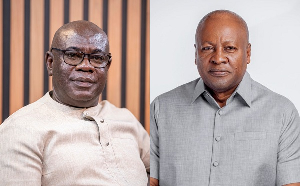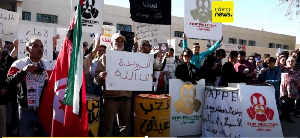By Kwame Okoampa-Ahoofe, Jr., Ph.D.
The dismissal of the District Chief Executive Officer of Ahafo Ano-South by President John Dramani Mahama, once again, raises the question of the imperative need of having all our local chief administrators - metropolitan, municipal and district - appointed by the popular vote. The dismissal of Mr. Gabriel Barima comes in the wake of several demands from influential personalities, both within and without the ruling National Democratic Congress (NDC), following the now-former DCE's intemperate and public display of tantrums and abject lack of emotional maturity and the kind of diplomatic demeanor that comes with the job.
In the main, Mr. Barima was shown in a widely publicized videotape pooh-poohing a health worker who had dared to impugn his administrative qualification and competence with the popular Akan-language snort of "Tweaa" (See "Mahama Sacks 'Tweaa' DCE" MyJoyOnline.com 3/5/14). Mr. Barima had also abruptly stormed out of a gathering at which he had been invited as the keynoter. Some media sources even claim that he had slammed his microphone to the ground in his fit of rage. He would shortly be reported to have profusely apologized to the President for conduct grossly unbecoming of a highly placed local government administrator and be allowed to keep his job, but only briefly, now it seems.
But what makes Mr. Barima's churlish deportment worthy of national conversation, or town-hall meeting, is the fact that it cuts poignantly at the core of the debate on whether having our local government administrators elected by the very people whose interests they have been sworn to serve, would not be far better than these government operatives being appointed directly from Accra or by the head of the central government. The current process almost invariably fosters cronyism of the worst kind, since the President can only depend on the advice of party insiders from the various localities who may not necessarily have the interests of the people at heart but their own.
And, indeed, the latter state of affairs clearly appears to pertain, as evinced by the tens of handpicked appointees, like Mr. Barima, who have been roundly rejected by local residents and inhabitants throughout the country. The current policy is regressive because it causes undue administrative delays, as regional ministers have had to perform multiple pinchhits, in addition to their primary duties, while more acceptable candidates were being sought. Siginificant local projects, in the meantime, cannot be efficiently executed, which adds up to the massive slowdown of local and, in effect, national development as a whole.
In his maiden State-of-the-Nation Address a couple of weeks ago, Mr. Mahama jovially hinted at the fact that reprehensible characters like Mr. Barima were finding easy access to the headship of local governments because, by and large, his government has been grossly incapable of providing these prospective local administrators with the requisite orientation and professional skills. Needless to say, such inadvertent self-indictment points to the immediate and imperative need for local administrators to be directly elected by the people, if also because the people are best positioned to know which candidates are best qualified to take care of their business.
And what is more, this is what grassroots democracy is incontrovertibly about. The present regime encourages the patently unsavory and unprogressive appointment of yes-men and yes-women whose primary and principal loyalties are to their bosses and political patrons, rather than the people themselves. There is also the governance and/or ideological aspect of this argument which may be deemed to be valid, only if one also accepts the flagrantly false premise of birds of identical plumage flocking together.
The fact of the matter is that in any civilized and functional democracy, all politics is local, irrespective of ideological stripe. It is accountability that is the ideal and foremost objective. And it is the latter that has been sorely lacking in the current process by which our local administrators are selected.
Mr. Barima's dismissal was obliquely attributed to his abject lack of emotional depth, or gravitas, and intellectual maturity. He is reported to have granted several media interviews in which he gloated on his new-found notoriety which he had, somehow, curiously mistaken for popularity and even celebrity, to the extent of even morbidly suggesting that he had virtually become a prime cynosure of tourism, or tourist attraction. "Many students and ordinary citizens are dying to meet the DCE who said 'Tweaa,'" one media source reported.
_____________________________________________________________
*Kwame Okoampa-Ahoofe, Jr., Ph.D.
Department of English
Nassau Community College of SUNY
Garden City, New York
March 6, 2014
E-mail: okoampaahoofe@optimum.net
###
Opinions of Tuesday, 11 March 2014
Columnist: Okoampa-Ahoofe, Kwame














